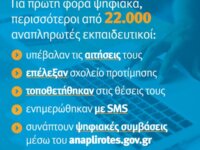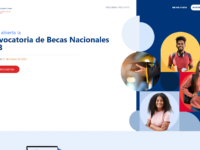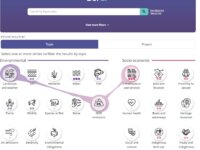DYPA, the Hellenic Public Employment Service (former OAED) has developed myDYPAapp, a mobile application that provides citizens with access to DYPA’s online services from their mobile phones. It was launched in February 2021, as an adaptation of DYPA’s services to new needs and modern technology that require the digitization of services, interaction and immediacy in serving citizens’ needs. myDYPAapp is innovative as it includes a wide range of user interaction possibilities with DYPA.
Innovation Tag: Open Government
The innovation is a platform where all government sectors and private sectors can acquire the UAEPASS (Federal Digital Identity) log-in Application Programming Interface (API) and other services from a single platform. Similarly, in this platform the end-user can install the API without interference with the UAEPASS Operation team.
The Greek education system needs about 50,000 substitute teachers every year to staff schools. In order to begin teaching, these teachers have to travel to their district education headquarters to sign their one year contract with the state. Through the Substitute Teachers Platform, the contract is signed digitally, avoiding unnecessary travelling and allowing for the necessary information systems of the public administration to be updated in an interoperable way. This innovation thus saves…
"Plaza Mayor" is an innovative multi-channel citizen participation project used by the public administration to collect citizens' proposals. Both face-to-face and digital media were used simultaneously to give a voice to the entire Asturian population. The data analysis methodology used allows for an immediate implementation of the results obtained, as well as the reuse of the information in the future.
The Unique Scholarship Portal (Portal Único de Becas “Beca tu Futuro”) is a web platform that aims to concentrate all scholarship opportunities in a single portal. In this way, it documents and manages everything from the publication of the call for applications to the awarding of scholarships. The portal benefits all the citizens of the Dominican Republic who wish to apply for a scholarship. Moreover, the portal serves as a management tool for the scholarships' evaluators and the…
In 2016, Ukraine launched an electronic asset declaration system, requiring public officials to disclose earnings and assets, in an effort to combat corruption and enhance accountability of public figures. With support from international partners, the e-register system hosts a global database of assets of public officials and has over 1,450,000 registered users.
The Buenos Aires City Government launched Climate Action, an open data platform that brings together energy efficiency, sustainability and waste management policies to combat climate change in the city. The platform is based on transparency, co-creation, collaboration, citizen participation, accountability and innovation. BA Climate Action was co-created with civil society organizations, environmental experts and citizens.
The TAP portal is a unique e-government system at the European Union level, which ensures the development of digital government legislation, moving from documents to structured data. The TAP portal ensures the proceedings of the meetings of the Cabinet of Ministers and allows every citizen of Latvia to follow the progress of the Government's decision-making and express an opinion on the regulatory acts being developed by the Government.
Governments are buried in hard-to-search PDF documents that hold data with great value for citizens, scientists, and public servants. At the Canada Energy Regulator, we developed data science methods to liberate 20 years – and tens of thousands of kilometres – of environmental and socio-economic data from over 1900 PDF documents from oil and gas pipeline applications. We made it easy to search and explore this data in our powerful and user-friendly search tool, BERDI.
As part of Gov. of Canada ininitiatives to measure regulatory burden, ministries have to report their Administrative Burden Baseline (ABB) a metric calculated using a decision tree based on the text of regulations. This is a long and tedious process that requires combing through regulation and manually parse individual provisions. The Regulatory Evaluation Platform automates that process (it takes seconds v. weeks when done manually) and makes it more timely by allowing for weekly refreshes.







